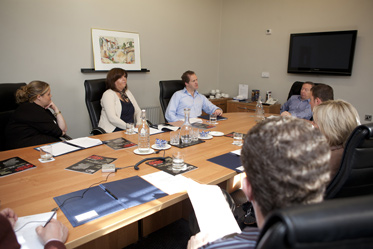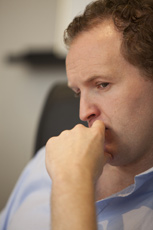Second generation publicans – ‘different environment, different approach’

The Discussion Forum was chaired by Drinks Industry Ireland editor Pat Nolan.
Pat Nolan: What do you remember of your parents working in the licensed trade?
Marcus Houlihan: Their hard work. They worked seven days a week, going back in on Sunday nights. I don’t think I work as hard as my parents did.
Geraldine Lynch: I feel the same. Long hours, long days, the Sunday thing, coming back from the country. My Mum enjoyed it, being there at busy times was a priority. It’s a different type of work now, certainly; I don’t work as hard. Mum and Dad bought the pub when they got married; the pub dates back to 1739. They came back from honeymoon to the Cuckoo’s Nest!
My dad had been in McGettigans in town and he’d been in Kells before that. My parents were great publicans, a hard act to follow; we’ll never be able to fill their shoes – especially my Mam’s!
Alan Byrne: I don’t think I work any less hard than my parents but they had to be in behind the bar all the time. I lived above the pub ‘till I was 10 and saw them more; you’d call him upstairs for dinner but yes, it was tough on them being there all the time. From the age of 10 to 15 or 16, I wouldn’t see my dad at all, really, because we moved out and he was there all the time; then I started working in the pub and I saw my parents all the time ….
Willie Ahern: … Very hands on and they really had a personal touch. I remember my father coming in behind the counter and the customers delighted to see him. He’d a very gentle presence but it made the customers’ evening when my father would come in. He’d a few words for everyone, a nod or salute, just the natural touch, the presence behind the counter.
PN: Have you tried to carry that on?
WA: You have to put your own stamp on it. But if I can bring to the table what he brought, yes.
Deirdre Devitt: Like Alan, we lived over the pub ‘till I was 14 so my memories are of coming home from school during the Holy Hour and that’s when you went in to see Dad. He was very much hands-on. We didn’t have many staff so he was down there all day every day. That’s when you went to see him and try to ‘blag’ a glass of red lemonade!
Even now he works hard. Back then, people wanted to see the publican behind the bar and right now, whatever about the boom, that’s what they want to see. They want you to notice them, give them the nod. They want the personal touch, for you to know what they’re drinking. It’s certainly going back to that.

"Back then, people wanted to see the publican behind the bar and right now, whatever about the boom, that’s what they want to see." – Deirdre Devitt.
Karen Mangan: I’d agree with everything that’s been said. My Dad was in the pub 24/7. I remember we spent a lot of time in the bars, running around and eating crisps and Coke. I don’t think the younger generation work as hard as our parents; we still have our one or two days off. My mother doesn’t work nowadays but back then she would have been in the kitchen and Dad and his brother would have been behind the bar quite a lot.
PN: What would be the big difference between then and now?
KM: There’s a huge difference between then and now. You’ve all the bans brought in, people coming in asking if you have Wi-Fi etc. Staff want more money and time off – in the boom they certainly did, nowadays they know they wouldn’t get it… And so many more regulations…
DD: …. I’d agree with Karen, a lot more regulations and rules…
KM: … Health and safety too…
DD: Technology and social media like Facebook have become so important to lots of pubs, even in suburban areas. It used be that people came in the door several times a day. Now you’ve to work so hard to get them in at all so you’ve got to try different ways to get people interested.
KM: You have to change your specials every day for them to come in the door.
GL: Before, you were sure of your business. It was predictable, a seven day business both in the sense of working and your business. But now Monday to Thursday are weaker. Our bar day trade would still be holding strong enough though it’s not even a third of what it was 10 or 20 years ago. In the 70s and 80s it was all day…
When people die, they’re not being replaced. They say you have an annual loss of 20 per cent and there aren’t people coming up to replace these punters because of the cultural changes. We all have to face that; people aren’t doing what they did before.
So your evening trade is mainly Friday to Sunday, everything’s very concentrated now.
Just from something we would have listened to recently in the LVA, the guys looking at market research and their radio results would have found that for a certain amount of young people, Friday is not the weekend whereas for us the weekend often began on a Thursday – so they’re going to change how they’re marketing and concentrate on a Friday.
You might have one drink after work, then go home and not go out again. Are they going home to see The Late Late or whatever? I think they’re worn out. People are up very early.
We’re under more rules and regulations than our parents and so the working population’s more stressed.
KM: Young people with children are under more stress with the drink-driving. They have just the Friday and Saturday nights to go out. To get a babysitter costs money and the drink-driving: there’s real fear out there, especially with what they’re doing now, bringing down the limit… And less money.
WA: I think nowadays we’re more reliant on occasions compared to years ago, like matches or sporting events, concerts or Arthur’s Day or getting parties into the pub… We have those big days whereas in our parents’ days it was steadier the whole time, consistent. The pub was the social outlet. Nowadays, there’s a huge culture change.
KM: People need a reason to go out now. They want to go out for something to eat, something special to do.
MH: They’re going out a lot later. Twenty years ago I would go into the pub about seven o’clock on a Friday evening and the place was full. Now, it mightn’t happen until nine o’clock. People are going out later and they’re staying out later. It can vary from one Friday to another. It’s a bit unpredictable now.
AB: People have to go home first and look after their kids and then come out. If they come out early and have a couple of pints after work, they go home.
DD: There’s a lot more planning. It’s not sporadic. Maybe it still is for people who don’t have responsibilities but I don’t think there’s a huge buzz on a Friday after work any more.
WA: In our parent’s time home drinking wasn’t an issue. When they would take a drink, the pub was their outlet. They were introduced to the pub at 18 or 19.
PN: Any other differences?
GL: Well maybe drugs…. You’re dealing with a different animal if the customer has consumed drugs. We’ve a bar we only open now for functions, we previously ran it as a music venue. If someone has too much drink taken, that’s different, it’s easier for a bar manager and the guards to deal with. If someone has drugs taken, they become a different person – it’s not that I’m advocating being drunk as opposed to high or low but you’ll hear the guards say the same thing. Our experience of it is much less the last couple of years ‘though. I think that’s because we’ve moved away from the music venue-type business and also people don’t have the money. You might see it more in the city centre…
KM: The biggest difference is claims. In my parents’ time if someone fell off a bar stool, they’d just get up and walk out. Now if they did it, it would be, “That was broken!”, floor tiles etc. Nowadays you can get cameras installed. My parents would never have had cameras in the pub in a million years.
DD: I probably have more freedom than my dad who was behind the bar all the time but there’s an awful lot more red tape. I don’t have a manager so I spend a lot more time in the office than my dad would have done then, I think. Also you need to be on top of the latest technology, internet, Facebook, checking-in, hubs, stuff like that – it all takes time.
WA: I think it’s longer hours. We’re not a late licence but still, by the time you get out of there, it’s a lot later than my father’s time. 12.30 came in a few years ago. It used to be 10pm on Sundays and there used to be Wintertime and Summertime. Customers are coming in later so by the time you get the house cleared and cleaned up, it’s much later getting home. There’s also what Deirdre touched on – a lot more red tape. You can’t rest on your laurels; you have to try different things – sometimes a bit of entertainment upstairs. You’ve got to deal with IMRO when they’re looking for a few shillings and you’ve the health crowd as well… I get caught up in the trenches, in behind the bar a lot, keeping on top of it all.

"I get caught up in the trenches, in behind the bar a lot, keeping on top of it all" – Willie Aherne.
AB: I think we have a lot more responsibility nowadays. We’ve got to be more proactive with the likes of Health and Safety, the red tape. And maybe they’re not drinking as much as they used to but you’ve got to be very careful about claims, who you serve and when you’re serving them. You practically have to mind the customers now in away you didn’t used to. There’s the law there for you to fall back on; you have a responsibility to the customer but I think there’s a higher expectation from the customers nowadays for quality and service and the product. You have to be looking for customers’ individual needs, for areas to be researched, for special drinks. If the customer decides he wants a certain foreign beer or a wine we’ll do our best to source it for him. Sporting events too – people are coming out for events and if you have the football game that people want to watch, you have to have a certain amount of digi-boxes to show it on.
GL: The same as the guys on that: rules and regulations and legislation. A lot of time spent trying to do the right thing. You’d always have had your insurance and electricity, but the likes of IMRO and Sky… It just seems a huge amount and they’re all increasing: it’s hard to control all of those. You need to be actively marketing your business whereas before, it came to you. You try to be up to speed on Facebook – at one point it was websites – but it’s changing all the time and you have to change with it.
MH: There’s a lot more alternative entertainment outlets for people and you’ve got to keep your business relevant. One big difference I see is staff. Back in the day, everyone behind the counter was at the very least an apprentice barman. I consider myself lucky as all our full-time staff are fully apprenticed barmen and we have a great manager.
DD: We lost the run of ourselves during the boom — you couldn’t get staff and we lost the whole apprenticeship thing.
MH: I’d like to see at least some sort of training coming back because I personally feel that the staff behind the counter are a reflection of me. I’m very fussy about who I put behind the counter and make no apologies for it. Customers expect to see good bar staff; they want service, they want quality. They’re paying near enough a fiver for a pint.
We currently train from within because between all of us, there would be 70 or 80 years’ experience behind the counter and there’s no substitute for experience.
WA: I came into a situation where staff in the Palace were 20 to 25 years there. It’s very hard when you come in with your ideas. You’re working for your father and he likes to see everything continue the way it was and you want to do little things and put your own stamp on the place. Things are changing and you see the opportunities, trying to get the staff who’ve been there 20-25 years to sing off the same hymn-sheet…
GL: I would have faced that in our own pub maybe 15 years ago. The nature of the human condition is to want not to change. It’s hard to come into something being ‘gung-ho’ with whatever background experience or training you’ve picked up yourself and you want to add that to your business. I’ve seen it with staff: you might do your own training and induction, all the right things, but they all get used to a pattern. So it’s how you introduce a change or explain something. Sometimes, when things appeared too good – and they were very good in the 90s – the guys’ attitude was, “Sure, they’re coming in anyhow, why do we need to change?”.
MH:… It’s the same for us. Every now and again we could do with a shake-up.
PN: What else has changed?
DD: When you see your dad working behind the bar for over 40 years, being with the same bank and you think, “We’ve been loyal to them”. We bought out my dad’s partner about five years ago at the top of the market. Now the banks appear not to want to work with you or make anything easy.
The branches have no power whatsoever. They don’t know what’s going on themselves, how secure their own jobs are. All the account managers who you’ve dealt with for years have been changed around. They’re all looking over their shoulders.
You’d nearly be better off in NAMA than being a small to medium two-pub business, just fighting to survive while they give you no support and there’s nothing there for the loyalty of the 40 years. You’re nearly on speed-dial. They’re watching every move.
KM: You can’t go in and get change or lodge between 12 and two. They used to have a section purely for your coins: now you’re just queuing like everyone else. I know they’ve made staff cutbacks. I went in the other day and he was refusing to give me night-safe bags. I said, “What do you expect me to lodge money with?”
– “Oh, you had six last week”
I said, “We have five bars, we need them”… It’s ridiculous.
MH: I’m probably in a different situation in the sense that we have a wider business or other businesses so I’ve benefited a bit from that with the bank. Regarding overdrafts, they come in and just cut it in half, no negotiation.
You say, ”We’re 40 years with you next year” and you get told, “Sorry, in the present environment that counts for nothing”. It’s a junior member of staff being put there to do this; it’s not coming from up above. But no, maybe I’m different: I have a very good relationship with the bank.
GL: We have a particularly big establishment which was great for the 70s and 80s but it’s quite hard to run now. The costs are huge and you’re open the whole time. What stands out for me are the commercial rates, absolutely crippling. We’ve a committee in the LVA looking at it and we’ve got involved with another group called Employers for Affordable Rates. For us, it’s almost €1,300 a week for nothing; it’s a tax and you’re not getting any direct benefit. It’s a great white elephant and having spoken recently to one of the ministers, there was a hope that when the property taxes came in it would take a bit of the pressure off us but I don’t think there’s anything coming along the line there. The whole thing is a bit of a disaster.
DD: There’s enough pressure on trying to get people in the door. You’ve got receivers running pubs and I think they’re running them into the ground. We’re trying to compete with a pub selling pints for €2 or €3. It’s long-term pain for short-term gain because you will lose customers to it initially. In many cases the guys running those businesses or leases are not paying VAT, they’re not paying anything. I think the VAT should come down further in the hospitality industry. It’s one of those things that make it very hard.
MH: I’d agree with Deirdre. They’re just running pubs into the ground and have no interest at all in the long-term viability of the pub. They’re just waiting for a few years down the line when hopefully things will turn round and the bank will be able to sell it on. Meanwhile they just want to earn a fee here but they don’t have a five- or a 10-year outlook…
PN: Has Dublin its own unique problems for the licensed trade?
MH: Begging, pickpockets, assaults, rents and rates in the city centre… Generally the cost of doing business is higher but a lot of it wouldn’t be unique to a capital city; they’d be the same for any major urban centre.
WA: I agree with Marcus. But I’d rather be in the capital city. I think we have footfall. Tourists come to Dublin as well.
GL: My mum said to me yesterday that she enjoyed it. I mean the Dublin wit is second to none and my parents were country people. I would enjoy it too but it’s a much more stressful environment. It was more laid back then and you’d have great fun with your customers. I’d be in the bar on a Monday morning and you’d have to be prepared for a slagging.
PN: Still enjoyable?
DD: Oh yes! I think it’s a great environment to work in. Sometimes I lock myself up in the office and get caught up in the red tape – trying to do everything right. I’m more relaxed about it the last few years and it’s very much back to basics. It’s really come full circle.
AB: I can’t imagine doing anything else! It’s hard work but very enjoyable. I have a family to think about now but I can spend time with them during the day and work at night when they’re asleep anyway.

"People have to go home first and look after their kids and then come out. If they come out early and have a couple of pints after work, they go home." – Alan Byrne.
KM: I still enjoy it. It’s brilliant. Every day is a struggle trying to get more customers in, you’re trying to see what else you can do, but it is very enjoyable. I don’t see myself having an office job, the nine to five, no way! I like dealing with people; it’s good craic and as Geraldine says, you never know who or what is going to walk in the door!








